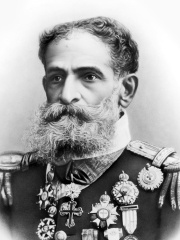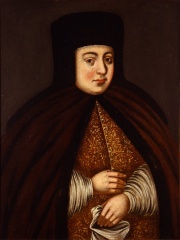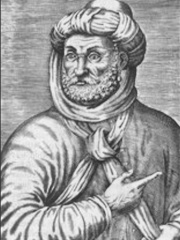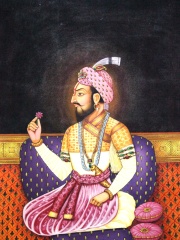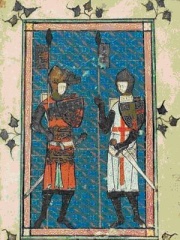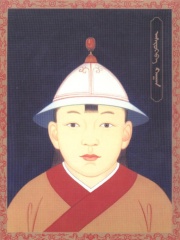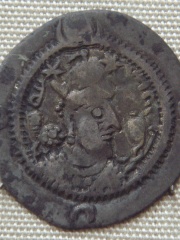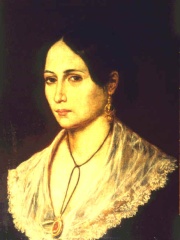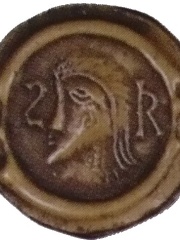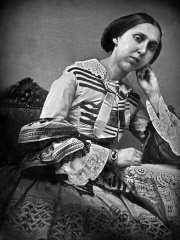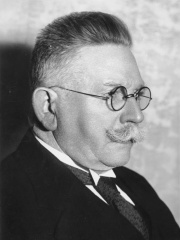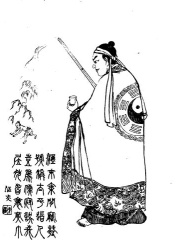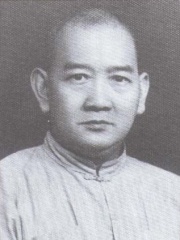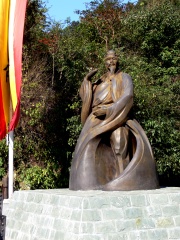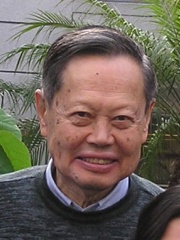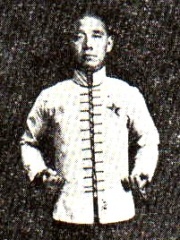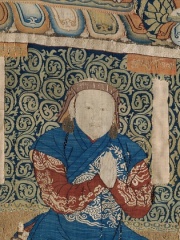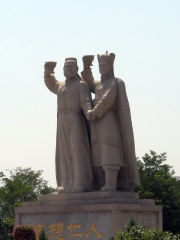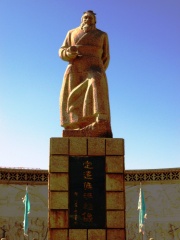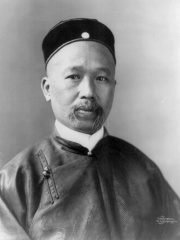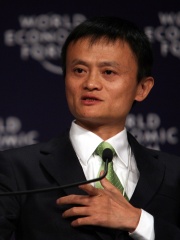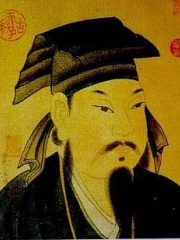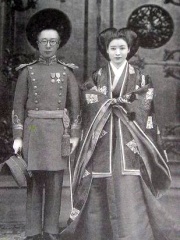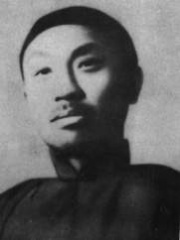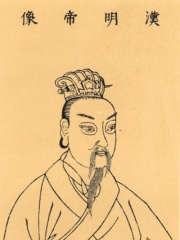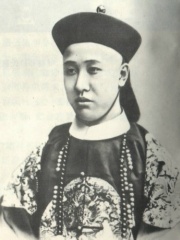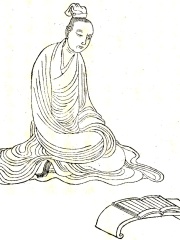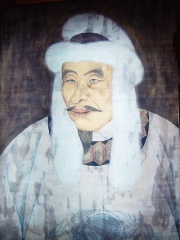Politician
Diaochan
EN.WIKIPEDIA PAGE VIEWS (PV)
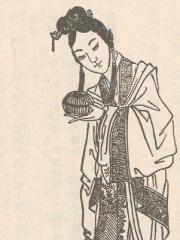
 Diaochan
Diaochan
Diaochan was one of the Four Beauties of ancient China. Although based on a minor historical personage, she is mostly a fictional character. She is best known for her role in the 14th-century historical novel Romance of the Three Kingdoms, which romanticises the events in the late Eastern Han dynasty and the Three Kingdoms period. In the novel, she has a romance with the warrior Lü Bu and causes him to betray and kill his foster father, the tyrannical warlord Dong Zhuo. Read more on Wikipedia
Her biography is available in 23 different languages on Wikipedia. Diaochan is the 3,403rd most popular politician (down from 2,809th in 2024), the 232nd most popular biography from China (down from 219th in 2019) and the 140th most popular Chinese Politician.
Diaochan is most famous for her beauty and for her role in the story of the "Three Kingdoms."
Memorability Metrics
Page views of Diaochan by language
Among Politicians
Among politicians, Diaochan ranks 3,403 out of 19,576. Before her are Deodoro da Fonseca, Natalya Naryshkina, Ahmad al-Mansur, Sambhaji, Abolhassan Banisadr, and Thomas of Lancaster, 1st Duke of Clarence. After her are Ragibagh Khan, Hormizd IV, Anita Garibaldi, Sigebert II, Princess Eugénie of Sweden, and Alfred Hugenberg.
Most Popular Politicians in Wikipedia
Go to all RankingsDeodoro da Fonseca
1827 - 1892
HPI: 68.92
Rank: 3,399
Natalya Naryshkina
1651 - 1694
HPI: 68.92
Rank: 3,400
Ahmad al-Mansur
1549 - 1603
HPI: 68.91
Rank: 3,401
Sambhaji
1657 - 1689
HPI: 68.91
Rank: 3,402
Abolhassan Banisadr
1933 - 2021
HPI: 68.91
Rank: 3,403
Thomas of Lancaster, 1st Duke of Clarence
1388 - 1421
HPI: 68.91
Rank: 3,404
Diaochan
HPI: 68.91
Rank: 3,405
Ragibagh Khan
1320 - 1328
HPI: 68.91
Rank: 3,406
Hormizd IV
540 - 590
HPI: 68.91
Rank: 3,407
Anita Garibaldi
1821 - 1849
HPI: 68.91
Rank: 3,408
Sigebert II
602 - 613
HPI: 68.90
Rank: 3,409
Princess Eugénie of Sweden
1830 - 1889
HPI: 68.90
Rank: 3,410
Alfred Hugenberg
1865 - 1951
HPI: 68.90
Rank: 3,411
In China
Among people born in China, Diaochan ranks 232 out of NaN. Before her are Zhang Jue (200), Wong Fei-hung (1925), Zhang Sanfeng (1200), Yang Chen-Ning (1922), Huo Yuanjia (1868), and Khutughtu Khan Kusala (1300). After her are Ragibagh Khan (1320), Abaoji (872), Wong Kar-wai (1958), Ban Chao (32), Kang Youwei (1858), and Jack Ma (1964).
Others born in China
Go to all RankingsZhang Jue
SOCIAL ACTIVIST
200 - 184
HPI: 69.07
Rank: 226
Wong Fei-hung
MARTIAL ARTS
1925 - 1925
HPI: 69.01
Rank: 227
Zhang Sanfeng
WRITER
1200 - 1301
HPI: 68.99
Rank: 228
Yang Chen-Ning
PHYSICIST
1922 - 2025
HPI: 68.98
Rank: 229
Huo Yuanjia
MARTIAL ARTS
1868 - 1910
HPI: 68.98
Rank: 230
Khutughtu Khan Kusala
POLITICIAN
1300 - 1329
HPI: 68.93
Rank: 231
Diaochan
POLITICIAN
HPI: 68.91
Rank: 232
Ragibagh Khan
POLITICIAN
1320 - 1328
HPI: 68.91
Rank: 233
Abaoji
POLITICIAN
872 - 926
HPI: 68.89
Rank: 234
Wong Kar-wai
FILM DIRECTOR
1958 - Present
HPI: 68.88
Rank: 235
Ban Chao
MILITARY PERSONNEL
32 - 102
HPI: 68.87
Rank: 236
Kang Youwei
WRITER
1858 - 1927
HPI: 68.82
Rank: 237
Jack Ma
BUSINESSPERSON
1964 - Present
HPI: 68.80
Rank: 238
Among Politicians In China
Among politicians born in China, Diaochan ranks 140. Before her are Pang Tong (179), Wang Xizhi (303), Emperor Shenzong of Song (1048), Pujie (1907), Chen Duxiu (1879), and Khutughtu Khan Kusala (1300). After her are Ragibagh Khan (1320), Abaoji (872), Emperor Ming of Han (28), Zaifeng, Prince Chun (1883), Zhang Liang (-290), and Emperor Taizu of Jin (1068).
Pang Tong
179 - 214
HPI: 69.25
Rank: 134
Wang Xizhi
303 - 361
HPI: 69.19
Rank: 135
Emperor Shenzong of Song
1048 - 1085
HPI: 69.14
Rank: 136
Pujie
1907 - 1994
HPI: 69.12
Rank: 137
Chen Duxiu
1879 - 1942
HPI: 69.12
Rank: 138
Khutughtu Khan Kusala
1300 - 1329
HPI: 68.93
Rank: 139
Diaochan
HPI: 68.91
Rank: 140
Ragibagh Khan
1320 - 1328
HPI: 68.91
Rank: 141
Abaoji
872 - 926
HPI: 68.89
Rank: 142
Emperor Ming of Han
28 - 75
HPI: 68.77
Rank: 143
Zaifeng, Prince Chun
1883 - 1951
HPI: 68.74
Rank: 144
Zhang Liang
290 BC - 186 BC
HPI: 68.73
Rank: 145
Emperor Taizu of Jin
1068 - 1123
HPI: 68.68
Rank: 146
